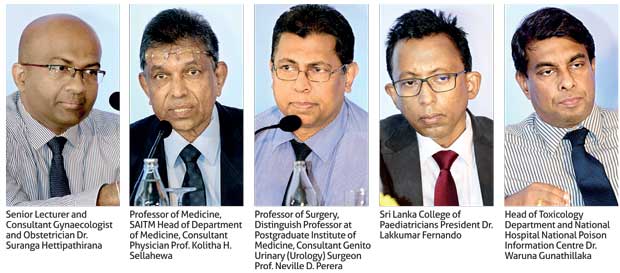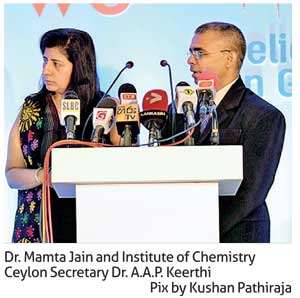19 Jan 2017 - {{hitsCtrl.values.hits}}

Though Sri Lanka does not have a strong stance on reducing the usage of plastic, many countries have taken big leaps to ban plastic and to highlight the health hazards pertaining to the leach of plastic.
In a bid to create awareness on this, Believers in Glass, an Indian social movement, tied up with Piramal Glass Ceylon PLC organised a press conference in Colombo recently, with the assistance of several leading health professionals in the country.
However, as the discussion highlighted many health-related issues such as cancer, infertility, obesity, asthma, diabetes, etc., due to the leach in plastic, the main question that popped up in many minds was as to why these were not given serious consideration before and why the gatekeepers of the country were not informed about the depth of this, which needed much focus.
Why is plastic harmful?
Plastic, a petroleum product, is a vital manufacturing ingredient for nearly every existing industry, though it has a dark side too.
One of the main reasons why many oppose using plastic is it poisons the food chain, affecting human health. As it is not easily disposable, it spoils the ground water and piles up in the environment. It also attacks other pollutants and costs billions to abate.
“See the number of bottles we are throwing. We are talking about consuming and storing bottles; we are throwing thousands of bottles to the earth with a toxic material sent to the earth all the time,” Professor of Surgery Professor Neville D. Perera said.
When it comes to storing and consuming, it was noted that plastic medical containers can be dangerous depending on the time in storage and temperatures.
Sharing evidence, they said that studies suggest that chemicals are responsible for various adverse events – leach from plastic increase by thousandfold when the water content in a bottle is exposed to the sun.
A study carried out by the University of Missouri states that PET-bottled water triggered a 78 percent increase in the growth of the breast cancer cells when compared with control water.
A Columbia University research also has reported that excessive exposure to endocrine disruptors/phthalates might increase a child’s future risk of developing asthma.
“Eighty percent increased risk of developing asthma between age of five and 11, if their mothers were exposed to high levels of phthalates during pregnancy,” it was noted.
Moderator Dr. Mamta Jain said that plastics and their additives are not just around us, they are virtually inside everyone of us, present in blood and urine in measurable amounts due to the leach in plastic.
It was noted that even the safest of safe claimed plastic leaches dangerous chemicals, which disrupts the entire body.
“Research has now proven that even the safest of safe plastic like BPA leaches dangerous chemicals and there is no such thing as safe as plastics. A global study now has established it without doubt that no plastic is safe for human exposure,” it was noted.
 Panellists from left: Senior Lecturer and Consultant Gynaecologist and Obstetrician Dr. Suranga Hettipathirana, Professor of Medicine, SAITM Head of Department of Medicine, Consultant Physician Prof. Kolitha H. Sellahewa, Professor of Surgery, Distinguish Professor at Postgraduate Institute of Medicine, Consultant Genito Urinary (Urology) Surgeon Prof. Neville D. Perera, Sri Lanka College of Paediatricians President Dr. Lakkumar Fernando and Head of Toxicology Department and National Hospital National Poison Information Centre Dr. Waruna Gunathillaka
Panellists from left: Senior Lecturer and Consultant Gynaecologist and Obstetrician Dr. Suranga Hettipathirana, Professor of Medicine, SAITM Head of Department of Medicine, Consultant Physician Prof. Kolitha H. Sellahewa, Professor of Surgery, Distinguish Professor at Postgraduate Institute of Medicine, Consultant Genito Urinary (Urology) Surgeon Prof. Neville D. Perera, Sri Lanka College of Paediatricians President Dr. Lakkumar Fernando and Head of Toxicology Department and National Hospital National Poison Information Centre Dr. Waruna Gunathillaka
Stress strong policies
Considering these facts, the health experts stressed that the government should bring in policies to stop using plastic gradually due to its adverse health effects.
“I see a lot of mothers use plastic milk bottles for their baby. I think that is not something intelligent. Chemicals getting into sense will be harmful. I think it won’t be a bad idea for the government to take a strong policy to try and altogether ban the infant feeding bottle at least for babies,” Sri Lanka College of Paediatricians President Dr. Lakkumar Fernando said.
“One of the things the plastic industry would defend themselves in is that they say there is a permissible amount of leach. Those things are brought to safeguard the industry. Exposure in whatever amount of permissible level also can be harmful,” he said.
“Is plastic being tested anywhere in the country? If so, where it is? It is a big question. Plastic production we use in daily life, for example, feeding bottles. In the Borella junction, in supermarkets, baby cups and spoons you get in plastic and beneath it’s written as melamine. You know how effective melamine was in the recent past. Melamine plates are not suitable even for elders,” Professor of Medicine, SAITM Head of Department of Medicine and Consultant Physician Professor Kolitha H. Sellahewa said.
“The second point is plastic water tanks. Earlier there were cement and stainless steel tanks. When the British were here, they used steel tanks. But due to rust, we changed to plastic. It reacts according to the temperature where we set the tanks. Plastic tanks should be covered, avoiding the sun rays,” he advised.
“The PVC water pipes are also plastic. Developed countries won’t use PVC though we use. The European Union has banned. Some countries are facing out gradually. In the future, policies should be implemented to put this away from our country,” he said.
Another point he highlighted was the food covered in the polythene sachets. “Even the water straw and ice packets – but nobody is questioning these things. People should be more aware,” he said.
Providing more examples he said, “When we microwave, every plastic is not the same; there are compatible plastics, there are different signs for that. People should be aware of this. These should be corrected. A lot of mistakes are happening across. The policymakers should come forward,”
Impact on future generation
Meanwhile, it was noted that if females get exposed to such chemicals during the reproductive age, there are chances of them having higher risk of infertility.
“In the female system, all the eggs are produced right at the birth. When they get exposed to these chemicals, these eggs go through a lot of changes.
In society they say miscarriages happen because of long-distance travelling, eating papaw and pineapple, but that is not the cause. It is because of the changes in genes. So like these, they have found out chemicals would cause a lot of damages to genes, which can be a major reason for miscarriages. Like some studies say, it can lead up to 50 percent of miscarriages in pregnancy,” Senior Lecturer and Consultant Gynaecologists and Obstetrician Dr. Suranga Hettipathirana said.
“Genes are the building blocks in our system. They could develop to many abnormalities. Likewise, it can affect this generation and we know the genes we carry we pass on to our kids, our new generation. It goes like that. It could go to subsequent generations as well,” he said.
“Passing my 32nd year as a doctor, during the last two decades, there were young couples coming saying their sperm count is low for many reasons. I think the chemicals in food and drinking water are playing a major role, as it has been investigated now. It has been found fertility can be affected by all the chemicals seeping from the plastic bottles,” Professor Perera said.
However, the health professionals noted that they are not backed by any company. They came forward only because it was a good opportunity for them to make awareness on this, as toxic will be always toxic.
Requests media support
“We request the media support to help to lobby these to the government, we need your help to get policymakers also on the bench. Doctors are only expressing their concerns.
We want the entire media’s help. This is a small movement. We wanted the doctors to be part of it because we take health for granted. Let the media drive it, let the glass and plastic makers come in, let all of them answer all the tough questions. It is media’s responsibility to empower the people with the knowledge,” the organisers said in response to a journalist’s query about the participation of other relevant parties in order to get balanced and accurate information on an important issue as such.
“What we are discussing here today is completely based on scientific literature. The facts we are forwarding are not just hypothetical facts but based on experiment and research done all over the world. Whoever requires any scientific evidence or researches do not hesitate to contact us,” Institute of Chemistry Ceylon Secretary Dr. A.A.P. Keerthi said.
09 Jan 2025 4 hours ago
09 Jan 2025 5 hours ago
09 Jan 2025 8 hours ago
09 Jan 2025 8 hours ago
09 Jan 2025 9 hours ago